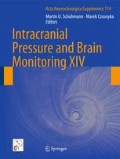Abstract
Atrial natriuretic peptide (ANP) plays an important role in body fluid homeostasis. ANP has been established as a marker of cardiac dysfunction and may play a role in brain edema development after traumatic brain injury (TBI). In order to identify its specific assignment following TBI, we related clinical data and treatment variables in 63 patients to longitudinal midregional (MR) proatrail natriuretic peptide (ANP) measurements. ANP correlated significantly to age (p < 0.0001) and vasopressin release (p < 0.001). Following TBI, ANP was increased initially and on day 3 (cut-off 100 pg/L) in 22% of the patients, in 31% on day 7, and was normalized at follow-up examination. The group comparison revealed that ANP levels did not significantly differ with regard to injury severity, but that high ANP levels predicted a worse Glasgow Outcome Score at 6 months (p < 0.05). While the initially intact osmoregulation – a correlation of urine volume and high serum sodium (r = 0.536, p = 0.003) or low urine osmolality (r = −0.556, p = 0.009) – got lost post-injury, the ANP release was triggered by volume load (p < 0.005). High ANP levels correlated with the neuroendocrine stress response, i.e., high cortisol (p = 0.05) and prolactin (p < 0.001) levels. We conclude that MR-proANP measurements reveal a significant predictive function for the prognosis of TBI.
Access this chapter
Tax calculation will be finalised at checkout
Purchases are for personal use only
References
Agha A, Thornton E, O’Kelly P, Tormey W, Phillips J, Thompson CJ (2004) Posterior pituitary dysfunction after traumatic brain injury. J Clin Endocrinol Metab 89:5987–5992
Chen Y, Li C (2009) Prognostic significance of brain natriuretic peptide obtained in the ED in patients with SIRS or sepsis. Am J Emerg Med 27:701–706
Fuat A, Murphy JJ, Hungin AP, Curry J, Mehrzad AA, Hetherington A, Johnston JI, Smellie WS, Duffy V, Cawley P (2006) The diagnostic accuracy and utility of a B-type natriuretic peptide test in a community population of patients with suspected heart failure. Br J Gen Pract 56:327–333
Fukui S, Fazzina G, Amorini AM, Dunbar JG, Marmarou A (2003) Differential effects of atrial natriuretic peptide on the brain water and sodium after experimental cortical contusion in the rat. J Cereb Blood Flow Metab 23:1212–1218
Giannakoulas G, Dimopoulos K, Bolger AP, Tay EL, Inuzuka R, Bedard E, Davos C, Swan L, Gatzoulis MA (2010) Usefulness of natriuretic peptide levels to predict mortality in adults with congenital heart disease. Am J Cardiol 105:869–873
Imura H, Nakao K, Itoh H (1992) The natriuretic peptide system in the brain: implications in the central control of cardiovascular and neuroendocrine functions. Front Neuroendocrinol 13:217–249
James ML, Blessing R, Phillips-Bute BG, Bennett E, Laskowitz DT (2009) S100B and brain natriuretic peptide predict functional neurological outcome after intracerebral haemorrhage. Biomarkers 14:388–394
Jennett B (1975) Outcome of severe damage to the central nervous system. Scale, scope and philosophy of the clinical problem. Ciba Found Symp:3–21
Kalisch F, Wurm A, Iandiev I, Uckermann O, Dilsiz N, Reichenbach A, Wiedemann P, Bringmann A (2006) Atrial natriuretic peptide inhibits osmotical glial cell swelling in the ischemic rat retina: dependence on glutamatergic-purinergic signaling. Exp Eye Res 83:962–971
Kaufman HH, Timberlake G, Voelker J, Pait TG (1993) Medical complications of head injury. Med Clin North Am 77:43–60
Kleindienst A, Brabant G, Bock C, Maser-Gluth C, Buchfelder M (2009) Neuroendocrine function following traumatic brain injury and subsequent intensive care treatment: a prospective longitudinal evaluation. J Neurotrauma 26:1435–1446
Kleindienst A, Brabant G, Morgenthaler NG, Dixit KC, Parsch H, Buchfelder M (2010) Following brain trauma, copeptin, a stable peptide derived from the AVP precusor, does not reflect osmoregulation but correlates with injury severity. Acta Neurochir Suppl 106:221–224
Knaus WA, Draper EA, Wagner DP, Zimmerman JE (1985) APACHE II: a severity of disease classification system. Crit Care Med 13:818–829
Le Gall JR, Lemeshow S, Saulnier F (1993) A new Simplified Acute Physiology Score (SAPS II) based on a European/North American multicenter study. JAMA 270:2957–2963
Lindner KH, Prengel AW, Pfenninger EG, Lindner IM, Strohmenger HU, Georgieff M, Lurie KG (1995) Vasopressin improves vital organ blood flow during closed-chest cardiopulmonary resuscitation in pigs. Circulation 91:215–221
Morgenthaler NG, Struck J, Alonso C, Bergmann A (2006) Assay for the measurement of copeptin, a stable peptide derived from the precursor of vasopressin. Clin Chem 52:112–119
Rosenberg GA, Estrada EY (1995) Atrial natriuretic peptide blocks hemorrhagic brain edema after 4-hour delay in rats. Stroke 26:874–877
Schneider M, Schneider HJ, Yassouridis A, Saller B, von Rosen F, Stalla GK (2008) Predictors of anterior pituitary insufficiency after traumatic brain injury. Clin Endocrinol (Oxf) 68:206–212
Teasdale G, Jennett B (1974) Assessment of coma and impaired consciousness. A practical scale. Lancet 2:81–84
Vanhorebeek I, Van den Berghe G (2006) The neuroendocrine response to critical illness is a dynamic process. Crit Care Clin 22:1–15, v
Acknowledgement
The statistical help of Dr. Marx, B.R.A.H.M.S. AG., is gratefully acknowledged.
Conflict of interest
Dr. Morgenthaler was an employee at B.R.A.H.M.S. AG, a biotech company that developed the midregional pro-atrial natriuretic peptide (MR-proANP) assay. Dr. Marx has assisted in the statistical analysis on the account of B.R.A.H.M.S. AG.
Author information
Authors and Affiliations
Corresponding author
Editor information
Editors and Affiliations
Rights and permissions
Copyright information
© 2012 Springer-Verlag/Wien
About this chapter
Cite this chapter
Kleindienst, A., Brabant, G., Morgenthaler, N.G., Emtmann, I., Scheufler, N., Buchfelder, M. (2012). The Atrial Natriuretic Peptide Does Not Serve Osmoregulation but Predicts Outcome Following Brain Injury. In: Schuhmann, M., Czosnyka, M. (eds) Intracranial Pressure and Brain Monitoring XIV. Acta Neurochirurgica Supplementum, vol 114. Springer, Vienna. https://doi.org/10.1007/978-3-7091-0956-4_54
Download citation
DOI: https://doi.org/10.1007/978-3-7091-0956-4_54
Published:
Publisher Name: Springer, Vienna
Print ISBN: 978-3-7091-0955-7
Online ISBN: 978-3-7091-0956-4
eBook Packages: MedicineMedicine (R0)

